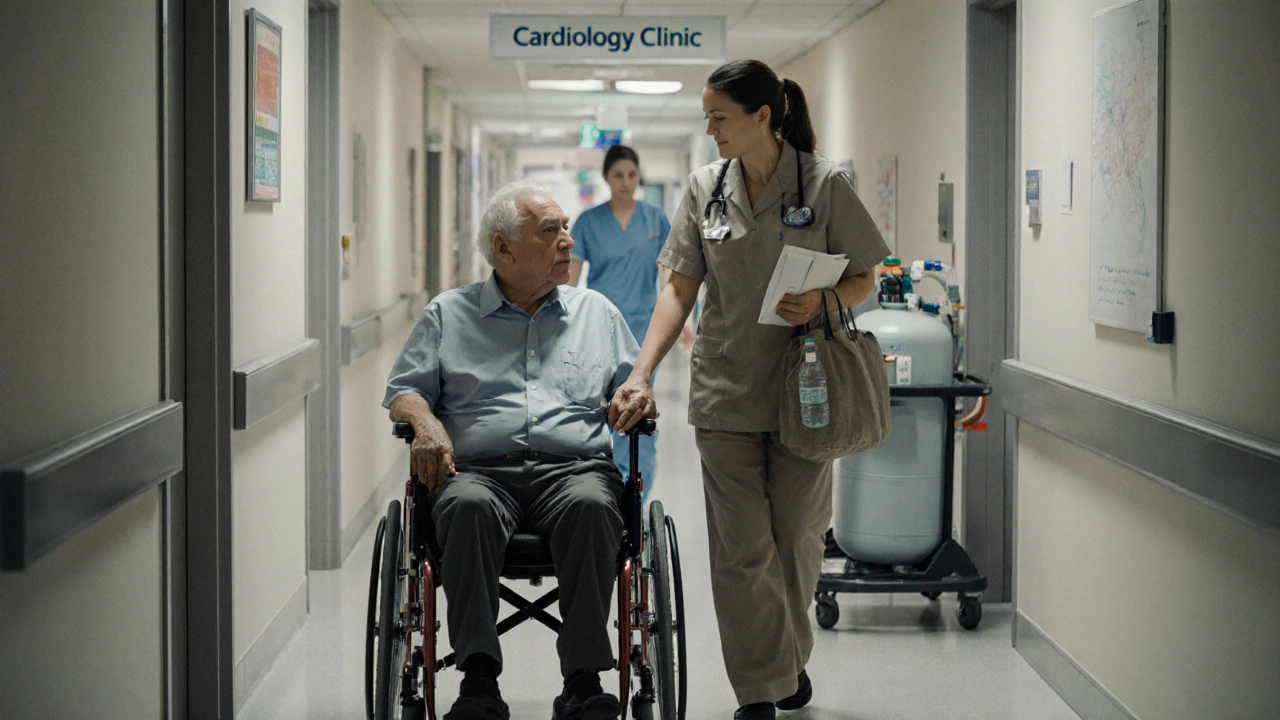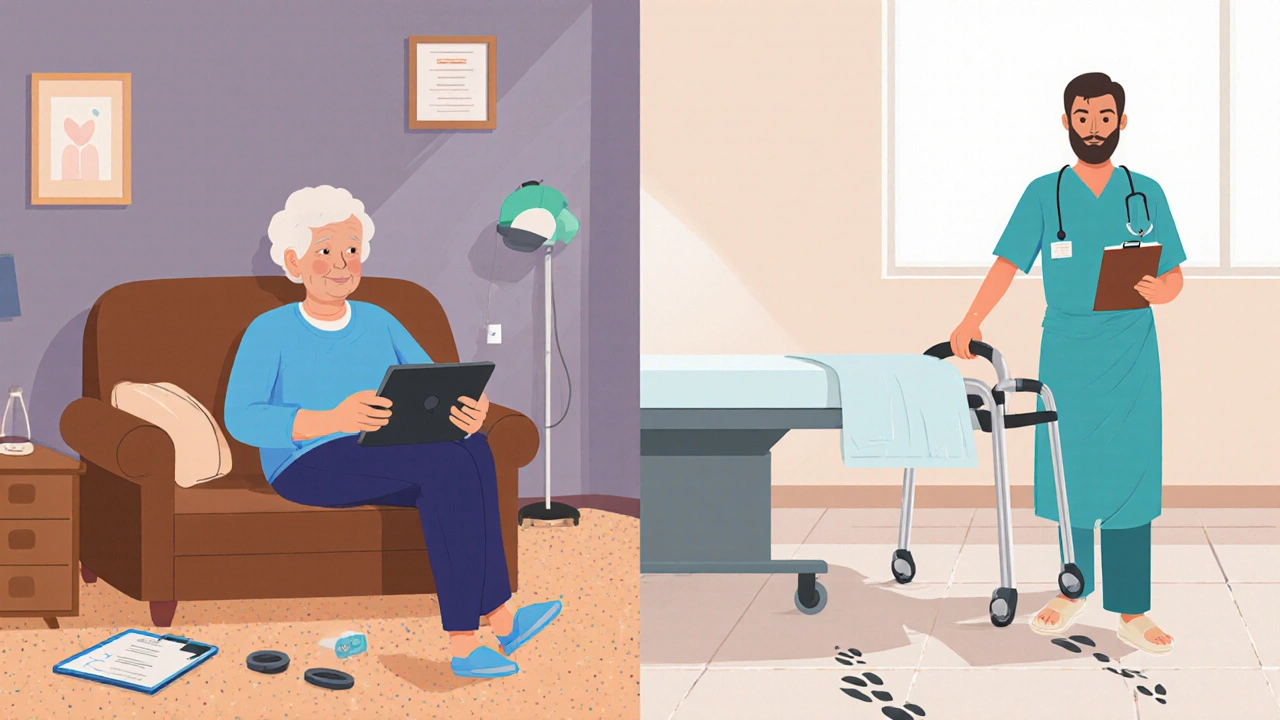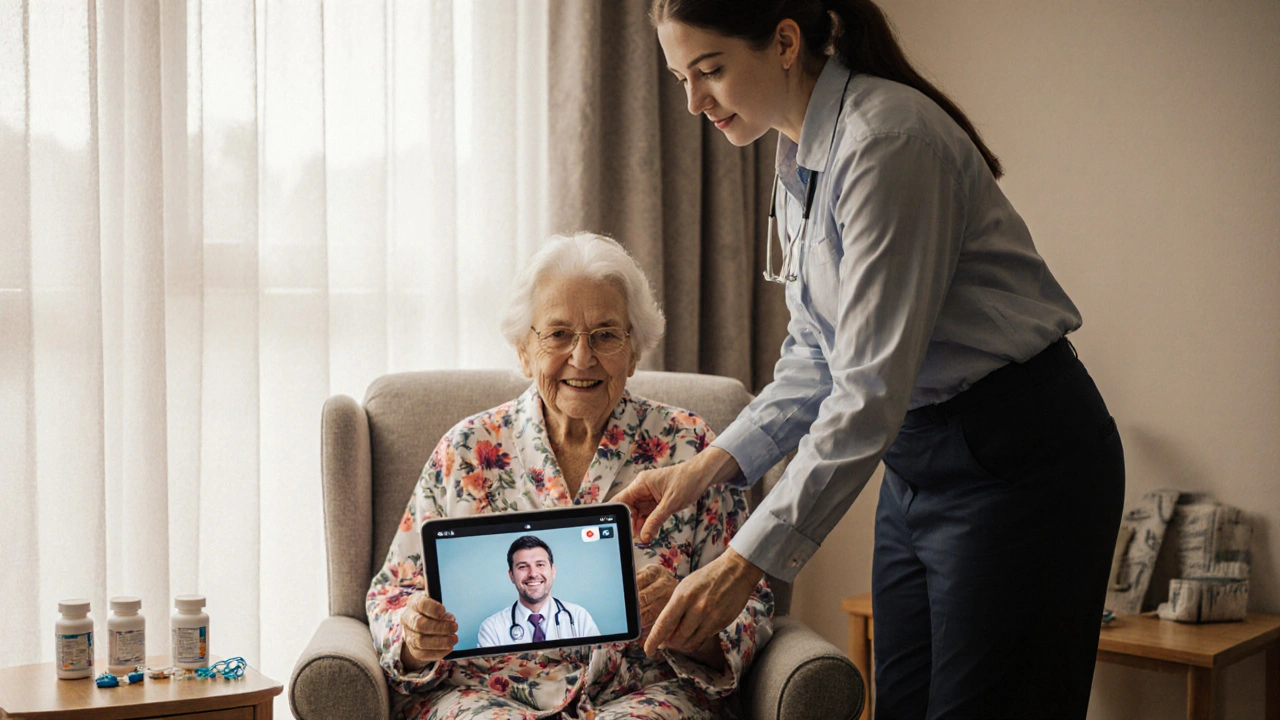Imagine you’re 72, recovering from knee surgery, and your doctor says you need a follow-up appointment next week. But getting to the clinic isn’t just a trip-it’s a risk. You’re still shaky on your feet, your car isn’t accessible, and public transport is a nightmare with bags, crutches, and a bad hip. What do you do? Call a ride? Hire someone to sit with you? Or just hop on a video call from your couch?
That’s where the choice between telehealth companion services and in-person medical escorts becomes real. They’re not the same. One helps you talk to your doctor from home. The other walks you into the hospital, carries your meds, and holds your hand when you’re scared. Knowing which one fits your situation can save time, money, and even prevent a fall or a panic attack.
What Is a Telehealth Companion Service?
A telehealth companion isn’t a nurse or a driver. It’s a trained support person who helps you use your video call with your doctor. Think of them as your tech coach and emotional anchor rolled into one.
They show up at your home-maybe in the morning, maybe after lunch-and sit with you while you connect to your appointment. They make sure your tablet is charged, your camera is facing you, your microphone isn’t muffled by blankets, and your hearing aids are on. They might help you find your pill bottle to show the doctor. They’ll nudge you if you forget to mention your dizziness or that new rash.
These services are often used by older adults, people with mobility issues, or those with cognitive challenges like early-stage dementia. A study from the University of Melbourne in 2024 found that patients using telehealth companions had 40% fewer missed appointments and 32% fewer repeat ER visits because their symptoms were caught earlier.
They don’t do medical tasks. No blood pressure checks. No lifting you off the couch. Just presence, patience, and tech help.
What Is an In-Person Medical Escort?
An in-person medical escort is someone who goes with you to the clinic, hospital, or lab-and stays with you the whole time. They’re not just a driver. They’re your advocate, your memory, and your safety net.
They help you get into the building. They wheel you to the exam room. They take notes while the doctor talks. They ask questions you’re too overwhelmed to think of: “What if I feel dizzy after the scan?” “Can I drive home after this?” “When do I start the new pills?”
They also handle logistics: making sure you have your insurance card, your list of meds, your walker, your water bottle, and your emergency contact number written down. After the appointment, they drive you home, help you get inside, and check that your prescriptions are filled.
These services are common for people recovering from strokes, undergoing chemo, or managing severe arthritis. In Western Australia, private medical escort companies saw a 68% increase in bookings between 2023 and 2025, mostly from seniors living alone.
When Telehealth Companion Services Make Sense
Use a telehealth companion when your main barrier is access-not mobility.
- You’re stable enough to sit in a chair but can’t drive or take public transport safely.
- Your doctor’s visit is a routine check-up, medication review, or mental health session.
- You have reliable internet and a smartphone or tablet.
- You’re comfortable with video calls but get flustered when tech glitches happen.
- You live alone and need someone to make sure you don’t forget to show up.
For example: Maria, 78, lives in Subiaco. She has type 2 diabetes and high blood pressure. Her doctor wants to adjust her meds every 3 months. Maria’s legs ache after walking 10 minutes, and her son lives in Adelaide. She hires a telehealth companion every quarter. The companion arrives, helps her log in, and sits quietly while the doctor talks. Maria says it’s the only reason she hasn’t missed a single appointment in two years.
Cost? Usually $30-$50 per hour, billed only for the time of the call. Many Medicare-approved providers in Australia offer bulk billing for eligible seniors.

When You Need an In-Person Medical Escort
Choose an in-person escort when your health needs go beyond a screen.
- You’re weak, unsteady, or at risk of falling during transit or in the clinic.
- You’re having a procedure, scan, or test that requires physical movement or recovery time.
- You’re confused, anxious, or unable to remember what the doctor said.
- You need help with physical tasks: getting on the exam table, putting on a gown, or using the bathroom.
- You’re on strong pain meds or sedatives and shouldn’t be alone after the appointment.
Take James, 65. He had a heart catheterization last week. His doctor told him to come back in 10 days for a follow-up. James can’t walk more than 50 meters without getting winded. He’s on blood thinners. He doesn’t trust himself to remember the post-op instructions.
His daughter hired a medical escort. The escort picked him up at 8 a.m., helped him into the car, sat with him during the appointment, wrote down the doctor’s notes, called his pharmacy to confirm his new prescription, and made sure he was settled back home with lunch ready.
Cost? $60-$100 per hour, depending on location and duration. In Perth, some services include transport, while others require you to arrange your own vehicle. Always ask: “Does this include the car and driver?”
What They Don’t Do (And Why It Matters)
Both services have clear limits. Knowing what they won’t do keeps you from being disappointed-or worse, unsafe.
Neither service:
- Provides medical care (no injections, no wound care, no CPR)
- Drives you in an ambulance (unless it’s a private medical transport company, which is different)
- Stays overnight or handles personal care like bathing or dressing
- Replaces a caregiver or nurse
Some people assume a telehealth companion can “check your vitals.” They can’t. Some think an in-person escort can “carry your oxygen tank.” Most can’t-unless they’re trained in medical equipment handling, which is rare and usually costs extra.
Always ask: “What exactly are you allowed to do?” before booking.

Insurance, Medicare, and Costs in Australia
Medicare doesn’t cover either service directly. But there are workarounds.
Telehealth companions: If you’re eligible for the Commonwealth Home Support Programme (CHSP), you might get funding for “social support” that includes tech assistance for telehealth. Some private health insurers offer extras cover that includes “non-medical transport support”-check your policy.
In-person medical escorts: Often paid out-of-pocket. But if you’re on the National Disability Insurance Scheme (NDIS) and your plan includes “transport and mobility,” you can use those funds for escorts. Some aged care packages (Home Care Packages Level 2-4) also cover escorted medical trips.
Private companies like MedTrans WA and CareRide Perth offer flat-rate packages: $120 for a 3-hour escort including transport and appointment support. Some even offer monthly plans for recurring visits.
How to Choose Between Them
Ask yourself these three questions:
- Can I physically get to the appointment without help?
- Will I need someone to explain or remember what the doctor says?
- Am I at risk of falling, getting lost, or feeling overwhelmed during the visit?
If you answered “yes” to the first question, and “no” to the other two, a telehealth companion is enough.
If you answered “yes” to any of the other two, you need an in-person escort.
Here’s a quick guide:
| Feature | Telehealth Companion | In-Person Medical Escort |
|---|---|---|
| Best for | Stable patients needing tech help | Unsteady, confused, or high-risk patients |
| Location | Your home | Home → Clinic → Home |
| Physical support | None | Yes-lifting, walking, transfers |
| Medical advocacy | Basic note-taking | Full advocacy: questions, follow-ups, medication checks |
| Cost (per hour) | $30-$50 | $60-$100 |
| Insurance coverage | Possible via CHSP or private extras | Possible via NDIS or Home Care Packages |
What Comes Next?
If you’re unsure which service you need, talk to your GP or an aged care coordinator. They can help you assess your risk level and refer you to the right support.
Some clinics in Perth now offer free 15-minute consultations with a care navigator just to help you decide. Ask your doctor’s office if they have one.
Don’t wait until you’re in the car, panicked, and realizing you forgot your meds. Plan ahead. Pick the right support before the appointment date. It’s not a luxury-it’s a safety measure.
Can a telehealth companion help me with my medications?
They can help you find your pill bottle or show your meds to the doctor during the video call, but they cannot prepare your pills, count them out, or give you instructions on how to take them. That’s a pharmacist’s or nurse’s job.
Do medical escorts provide transportation?
Some do, some don’t. Always confirm before booking. Many escort services partner with private transport companies. Others expect you to arrange your own car. If you need a wheelchair-accessible vehicle, make sure the service offers it.
Is telehealth as effective as seeing a doctor in person?
For routine check-ups, medication reviews, mental health sessions, and chronic disease management-yes. For physical exams, wound checks, or new symptoms like chest pain or sudden weakness-you need an in-person visit. Telehealth is a tool, not a replacement.
Can I use NDIS funds for a medical escort?
Yes-if your plan includes transport and mobility supports. You can use your NDIS funding to hire a trained escort to accompany you to medical appointments. Just make sure the provider is NDIS-registered and you’ve got the right plan category.
What if I need help after the appointment?
In-person escorts often stay until you’re safely home and settled. Telehealth companions leave after the call. If you need help cooking, bathing, or taking meds afterward, you’ll need a separate home care service or caregiver.
